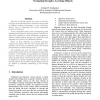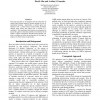509 search results - page 44 / 102 » Compositional Models for Reinforcement Learning |
138
click to vote
ICML
2010
IEEE
15 years 12 days ago
2010
IEEE
Temporal difference (TD) algorithms are attractive for reinforcement learning due to their ease-of-implementation and use of "bootstrapped" return estimates to make effi...
137
click to vote
CVPR
2007
IEEE
16 years 4 months ago
2007
IEEE
This paper presents a method of learning and recognizing generic object categories using part-based spatial models. The models are multiscale, with a scene component that specifie...
122
click to vote
HICSS
2003
IEEE
15 years 7 months ago
2003
IEEE
Libraries of learning objects may serve as basis for deriving course offerings that are customized to the needs of different learning communities or even individuals. Several ways...
197
click to vote
FASE
2011
Springer
14 years 6 months ago
2011
Springer
Probabilistic verification techniques have been applied to the formal modelling and analysis of a wide range of systems, from communication protocols such as Bluetooth, to nanosca...
104
click to vote
FLAIRS
2006
15 years 3 months ago
2006
This paper describes an investigation into the refinement of context-based human behavior models through the use of experiential learning. Specifically, a tactical agent was endow...


